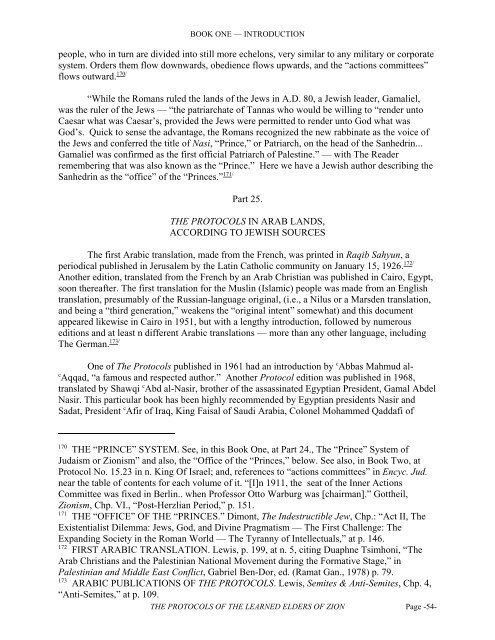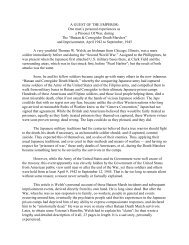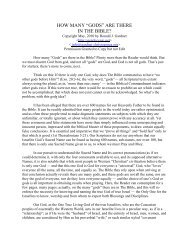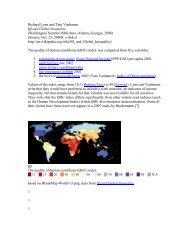The Protocols of the Learned Elders of Zion -- Book - A Gentle Cynic
The Protocols of the Learned Elders of Zion -- Book - A Gentle Cynic
The Protocols of the Learned Elders of Zion -- Book - A Gentle Cynic
You also want an ePaper? Increase the reach of your titles
YUMPU automatically turns print PDFs into web optimized ePapers that Google loves.
BOOK ONE — INTRODUCTION<br />
people, who in turn are divided into still more echelons, very similar to any military or corporate<br />
system. Orders <strong>the</strong>m flow downwards, obedience flows upwards, and <strong>the</strong> “actions committees”<br />
flows outward. 170/<br />
“While <strong>the</strong> Romans ruled <strong>the</strong> lands <strong>of</strong> <strong>the</strong> Jews in A.D. 80, a Jewish leader, Gamaliel,<br />
was <strong>the</strong> ruler <strong>of</strong> <strong>the</strong> Jews — “<strong>the</strong> patriarchate <strong>of</strong> Tannas who would be willing to “render unto<br />
Caesar what was Caesar’s, provided <strong>the</strong> Jews were permitted to render unto God what was<br />
God’s. Quick to sense <strong>the</strong> advantage, <strong>the</strong> Romans recognized <strong>the</strong> new rabbinate as <strong>the</strong> voice <strong>of</strong><br />
<strong>the</strong> Jews and conferred <strong>the</strong> title <strong>of</strong> Nasi, “Prince,” or Patriarch, on <strong>the</strong> head <strong>of</strong> <strong>the</strong> Sanhedrin...<br />
Gamaliel was confirmed as <strong>the</strong> first <strong>of</strong>ficial Patriarch <strong>of</strong> Palestine.” — with <strong>The</strong> Reader<br />
remembering that was also known as <strong>the</strong> “Prince.” Here we have a Jewish author describing <strong>the</strong><br />
Sanhedrin as <strong>the</strong> “<strong>of</strong>fice” <strong>of</strong> <strong>the</strong> “Princes.” 171/<br />
Part 25.<br />
THE PROTOCOLS IN ARAB LANDS,<br />
ACCORDING TO JEWISH SOURCES<br />
<strong>The</strong> first Arabic translation, made from <strong>the</strong> French, was printed in Raqib Sahyun, a<br />
periodical published in Jerusalem by <strong>the</strong> Latin Catholic community on January 15, 1926. 172/<br />
Ano<strong>the</strong>r edition, translated from <strong>the</strong> French by an Arab Christian was published in Cairo, Egypt,<br />
soon <strong>the</strong>reafter. <strong>The</strong> first translation for <strong>the</strong> Muslin (Islamic) people was made from an English<br />
translation, presumably <strong>of</strong> <strong>the</strong> Russian-language original, (i.e., a Nilus or a Marsden translation,<br />
and being a “third generation,” weakens <strong>the</strong> “original intent” somewhat) and this document<br />
appeared likewise in Cairo in 1951, but with a lengthy introduction, followed by numerous<br />
editions and at least n different Arabic translations — more than any o<strong>the</strong>r language, including<br />
<strong>The</strong> German. 173/<br />
One <strong>of</strong> <strong>The</strong> <strong>Protocols</strong> published in 1961 had an introduction by c Abbas Mahmud alc<br />
Aqqad, “a famous and respected author.” Ano<strong>the</strong>r Protocol edition was published in 1968,<br />
translated by Shawqi c Abd al-Nasir, bro<strong>the</strong>r <strong>of</strong> <strong>the</strong> assassinated Egyptian President, Gamal Abdel<br />
Nasir. This particular book has been highly recommended by Egyptian presidents Nasir and<br />
Sadat, President c Afir <strong>of</strong> Iraq, King Faisal <strong>of</strong> Saudi Arabia, Colonel Mohammed Qaddafi <strong>of</strong><br />
170<br />
THE “PRINCE” SYSTEM. See, in this <strong>Book</strong> One, at Part 24., <strong>The</strong> “Prince” System <strong>of</strong><br />
Judaism or <strong>Zion</strong>ism” and also, <strong>the</strong> “Office <strong>of</strong> <strong>the</strong> “Princes,” below. See also, in <strong>Book</strong> Two, at<br />
Protocol No. 15.23 in n. King Of Israel; and, references to “actions committees” in Encyc. Jud.<br />
near <strong>the</strong> table <strong>of</strong> contents for each volume <strong>of</strong> it. “[I]n 1911, <strong>the</strong> seat <strong>of</strong> <strong>the</strong> Inner Actions<br />
Committee was fixed in Berlin.. when Pr<strong>of</strong>essor Otto Warburg was [chairman].” Got<strong>the</strong>il,<br />
<strong>Zion</strong>ism, Chp. VI., “Post-Herzlian Period,” p. 151.<br />
171<br />
THE “OFFICE” OF THE “PRINCES.” Dimont, <strong>The</strong> Indestructible Jew, Chp.: “Act II, <strong>The</strong><br />
Existentialist Dilemma: Jews, God, and Divine Pragmatism — <strong>The</strong> First Challenge: <strong>The</strong><br />
Expanding Society in <strong>the</strong> Roman World — <strong>The</strong> Tyranny <strong>of</strong> Intellectuals,” at p. 146.<br />
172<br />
FIRST ARABIC TRANSLATION. Lewis, p. 199, at n. 5, citing Duaphne Tsimhoni, “<strong>The</strong><br />
Arab Christians and <strong>the</strong> Palestinian National Movement during <strong>the</strong> Formative Stage,” in<br />
Palestinian and Middle East Conflict, Gabriel Ben-Dor, ed. (Ramat Gan., 1978) p. 79.<br />
173<br />
ARABIC PUBLICATIONS OF THE PROTOCOLS. Lewis, Semites & Anti-Semites, Chp. 4,<br />
“Anti-Semites,” at p. 109.<br />
THE PROTOCOLS OF THE LEARNED ELDERS OF ZION Page -54






